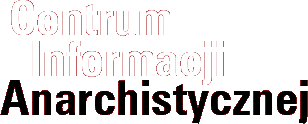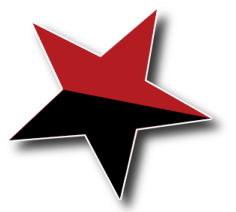El Libertario: A French questionnaire: Venezuela today
As the Venezuelan situation changes every day, I should clarify that I wrote this on 03/01/14 at 06:00 pm.
- Who are the people who took to the streets? They are only upper middle class people of some housing developments, militants of far-right parties and Colombian paramilitary activists, ("Aguilas Negras")?
- This question can only be answered correctly, referring to the beginning of this cycle of protests in Venezuela. On February 4 students at the Universidad Nacional Experimental del Tachira (UNET), in San Cristobal, staged a peaceful protest against insecurity, caused by the sexual abuse against a student. The protest was brutally suppressed by the Bolivarian National Guard (GNB), the agency of the Venezuelan Armed Forces in charge of "maintaining public order", and 6 students were arrested. On this episode we should clarify two things: 1) Historically the student movement in Latin America and Venezuela, has always rejected detained students in protests and 2) San Cristobal, capital of Tachira state, is a city located in a border area with Colombia that has been particularly hard hit for several years by interruptions of utilities (water and electricity mainly), price inflation as well as shortages of various consumer products. The arrest of these students led protests in other cities of the country, which in turn were suppressed by increasing the number of students arrested. This created an "snowball-effect", from the inner cities of the country to Caracas. It is in this climate of protests and unrest, which two opposition politicians (Leopoldo Lopez and Maria Corina Machado), make a call to hold demonstrations to demand the resignation of President under the slogan "the exit".
It is important to say that the rest of the opposition parties, including the coalition "Bureau of Democratic Unity" (MUD), and the governor of Miranda state, Henrique Capriles; rejected the first few days the protests, which have overwhelmed the political parties opponents. When I write these answers (03/01/14) the protest against the government was decentralized, with some violent foci but largely, peacefully. It also has two different dynamics : One in Caracas , starring with middle class students from public and private universities territorially in the east of the city, and basically with political demands (release of the students, the resignation of President and rejection of repression); and in the rest of the country, qualitatively more important than that one in Caracas because it incorporates popular sectors; and in some cities, (such as San Cristobal), rural areas (thus this city was militarized), and including social demands and lack of products, the high cost of living and lack of basic services.
- What is the government's response, (the level of repression) ? It is said that it finally has been very soft, forgiving and respectful of human rights. Truth or propaganda?
- Propaganda. The reality is that when I answer this (there are new events every day), there are 17 people murdered in the context of demonstrations, 8 of they - including the first three - that it have been shown were killed by state security agencies. During protests at the national level , have been arrested over 500 people, and there is plenty of evidence of torture, cruel, inhuman and degrading treatment of detained protesters, plus the number of people injured by firearms, shots and shots to the body of tear gas. The amount of pictures and videos taken by the protesters themselves has forced the government to recognize their responsibility in the killing of manifestants, and there are several members of the GNB arrested for authorship of the shooting. A novelty is the use of paramilitary groups to suppress the protests, that have been armed by the government, and act with tolerance and coordination of military and police forces. I personally know, right now, some people who are out of its house after being beaten and threatened with death by these paramilitary groups....
- What is the popularity of Maduro now?
- Maduro, unlike Chavez, is a very weak president internally in the Bolivarian movement. Already been receiving heavy criticism for making a economic adjustment program earlier this year, devalued the currency, increased some taxes and has allowed to the end of 2013, a 50 % inflation. For a political observer in Venezuela, right now, occurs a very interesting phenomenon: While the opposition is mobilized in protests, the basis of Chavismo doesn´t perform public acts supporting the government as happened during the years of President Hugo Chavez. The strong repression of the protests is rejected by large sections of Chavismo basis, who also knows that there is a malaise due to the economic crisis. The few marches by Nicolás Maduro, - exclusively in Caracas - only been able to mobilize public officials and beneficiaries of social policies.
- The Western media connect the opposition to current scarcity and insecurity. This is reality?
- First, the polarization of the international media about the Bolivarian government remains the same as in recent years , but inwardly in Venezuela the bourgeoisie of Chavismo has been purchasing media since 2002 , so there is now a lot of censorship in TV channels nationwide , and many pressures on radios and newspapers. There is a deep economic crisis and economic adjustment program is doing pay the costs of the crisis to the country's workers. Regardless of how you end this wave of protests, the government of Nicolas Maduro will continue to implement a package of economic measures that affect all people, especially those with limited resources .
- Why a country with a big oil wealth is facing daily shortage of the food?
- The government of Hugo Chavez, and now Nicolas Maduro, has deepened the role assigned to Venezuela by globalized capitalism: Sell oil, gas and other minerals to the global economic market, with the help of transnational companies. The real U.S. embassy in Venezuela is called "Chevron", whose chief business manager for Latin America Ali Moshiri, said dozens of times that "he has not had any trouble doing business with the Bolivarian government". Venezuela sells power to other countries and is importing 80 % of products consumed in the country. As never before the economy depends on the dollar, so having the right contacts in government for receive dollars to the official price, makes possible duplicate that money by 8 times, in few minutes, taking those dollars to black currency market. The dollar has created a "parasitic Bolivarian bourgeoisie" of state, whose main business is to receive money for imports.
- Is it true that there is a conspiracy of businessmen and traders to hide food in warehouse?
- I'm not going to defend a businessman, and surely there are many criminal entrepreneurs, like thieves in other sectors of an economy that depends on the state. But this isn't the main reason for food shortages in the country, what the government called "economic warfare". Two facts: 1 ) The two state food distribution chains (PDVAL and MERCAL), suffer the same level of food shortages that private companies, 2) The largest and most important private entrepreneur of country food sector, Lorenzo Mendoza, has met several times with President Maduro to increase production , which is a public and notorious news.
- Beyond the partisan blinders, are we not also watching the decline of oil revenue system? What is the responsibility of the Chavista state to this corruption?
- President Chavez himself called his project "oil socialism", regardless of the social and environmental consequences of the production of oil, gas and mineral resources for rural and indigenous communities. In fact the so-called "Patria Plan", in the plan of government of President Maduro, states to double by 2019 energy production in the country. Oil money, managed by the state, has corrupted social movements, who have given up independence and autonomy for receive a little bit of oil revenues. In a tight and short review, during the past 15 years power conflicts between the government and the opposition, can be characterized like as a clash between two bourgeoisies equally capitalists , in order to control oil revenues.
-Where are the social reforms and the fight against poverty? They are deepened sufficiently?
- Due to the increase in oil prices in the international market, the government of President Chavez, counted, during 2004 and 2009 with higher state's revenues in Venezuelan history the last 30 years. Despite having so high income and political control of the country, structural reforms were not made to causes of poverty in the country. From 2005 compensatory social policies were promoted, called "missions" that had a positive impact on the living standards of the poorest sectors of the population, in that way, they had a greater purchasing power of products, with the paradox of not leaving poverty. However, these "missions", were sustainable only with a high foreign exchange earnings, as a result of high oil prices on the world market. Since two years, these policies have been phased out or have been stagnated. An example today is the disastrous situation of the network of public hospitals in the country that do not have the equipment, infrastructure or medicines to cure different diseases of the population. This has led to a paradox within the government that calls itself "socialist": In the absence of an effective public health system, all state employees are insured for hospitalization, surgery and maternity in private sector's clinics.
- What is the real level of threat to the ultra-liberal right? Can you say that there is an attempt to destabilize the power?
- To that question, several comments as a response: 1) The opposition is divided and internally facing, and today doesn't have a unanimous position on street protests : One sector supports it and the other one simply criticizes it 2) Venezuela is in the process to transition towards "something else", because of the physical absence of Hugo Chavez, that some political analysts call "postchavismo". Regardless of how that transition could be completed and how these protests finalize, there is no way that the Bolivarian movement, broadly defined, is be completely displaced from power. Chavez has a wide base of support making it a major player in the short and medium term policy in Venezuela. So the result , now or later, will be the negotiation between a sector "Chavista" and another part of the "opposition " when necessary to ensure the country's governance; 3) In 2002 began a purge of middle and senior cadres of the army in Venezuela , so today the Armed Forces are committed to the Bolivarian government project, not only for ideological reasons, but also for economic. Never before have the military, who now exert numerous positions in the public service, have had controlled so many legal and illegal businesses in the country (for example, control of the ports for imports and exports of good ). For this reason there are so many possibilities that a "right-wing coup" - linked to opposition sectors - as a coup "left-wing" - a sector of Chavismo against Maduro -. In conclusion I must say that we the anarchists, along with other sectors of Venezuelan revolutionary left, equally reject the government and the opposition political parties, trying to build a social alternative, which in this case is called "libertarian". At this time we have denounced the government crackdown on protesters and the implementation of a package of economic measures has been downloaded on the shoulders of the people, the crisis created by government corruption and the old and new bourgeoisie in the country.
http://periodicoellibertario.blogspot.com/2014/03/a-french-questionnaire...






